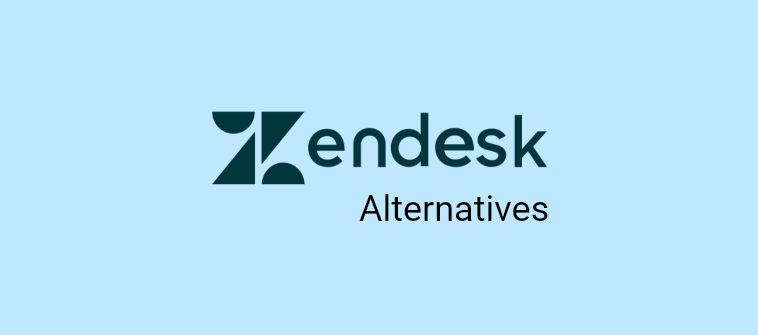
While searching for knowledge base software, chances are you might have bumped into Slab.
Built for the modern workplace, Slab helps teams collaborate and be their productive best at work. The tool is undoubtedly great for companies looking to democratize company knowledge and make internal work processes seamless.
But no matter how shiny the features and functionality, Slab has its share of flaws, and that’s why it is not the ideal tool for the unique needs of every business.
While some users complain about the limitations of its free plan, others feel that its user interface is outdated. Some are not very happy with the organization of topics the tool offers, and others are disappointed with the fact it is built specifically for internal use only.
In this blog, we have analyzed the top Slab alternatives on various aspects like features and usability and compiled a list of tools that might fit your business well.
What Is Slab?
Slab is a cloud-based knowledge base software built for the modern workplace. It democratizes company knowledge so teams across departments can use it in their day-to-day work. Whether it is for your sales, marketing, operations, or engineering teams – Slab is designed to make knowledge sharing easy and keep employees productive at work.
With modern editing features and an intuitive user interface, it’s easy to write and edit content in Slab. Moreover, there are other features that let you organize content logically so teams can browse the knowledge base and reach the right information quickly.
Designed diligently for internal use, Slab is a decent knowledge base tool to cultivate collaboration and boost productivity in the workplace.
Why Should You Look for Slab Alternatives?
Although Slab offers really good features ideal for creating internal wiki, knowledge base, or employee handbooks, we cannot ignore the fact that it falls short in some key areas. The knowledge base software has garnered negative reviews from users on reputed online sites, which make businesses question the effectiveness of Slab.
Slab is created mainly for internal use by teams, which means you cannot use it for customer self-service. An ideal knowledge base tool must be good at both – internal knowledge management and customer self-service support. But that’s not the case with Slab.
Some online reviews suggest a lack of text formatting options and the inability to add user groups. Some users feel the layouts are not advanced enough, and there are no options to embed PDFs or upload other file formats. Besides, for some, Slab lacks powerful integrations which are provided by its competitors.
Slab supports only the English language, which means you cannot create content in other languages. This is a major disadvantage, especially for those companies that have employees working across the globe.
Key Features That Slab Alternatives Must Have
Although Slab has got a stellar set of features yet, there are crucial areas where it doesn’t farewell. That’s precisely why businesses across industries look for Slab alternatives that fit their expectations and deliver superior performance.
Since there are multiple Slab alternatives, how do you decide which ones are worth your attention? Simply by checking the features they provide.
Here is a list of the top features that Slab competitors must have:
- An intuitive user interface that requires little to no training
- Beautifully designed knowledge base templates for faster and more compelling content creation
- The ability to create both public and private knowledge base
- External integrations with ticketing, chat, survey, analytics, and collaboration tools
- Features to add single users and groups, define their roles and permissions for collaborative content creation
- Insightful reports to track key performance metrics such as successful searches, popular and poorly rated articles, broken links, etc.
- SEO features to improve ranking and drive traffic to the knowledge base
- The tool should support translation in multiple languages to serve a diverse audience
- Customization options to change the entire appearance of a knowledge base
- A super-fast search system that shows the right information quickly, as soon as one starts typing
Our Selection Criteria for Slab Alternatives
To get you closer to the one tool that is just the right fit for you, we have adopted unbiased selection criteria just so you are relieved from the taxing process of finding the best alternative to Slab.
We have evaluated the tools on various aspects like features, usability, pricing, and many more to bring you nothing but the best. All Slab alternatives are carefully chosen based on the following criteria:
-
Essential Features
The tools must offer the key knowledge base features such as – an online editor, publishing options, reports, import and export, and user management.
-
Online User Reviews
The alternatives should have a minimum of 10 user reviews on reputed platforms like GetApp and Capterra. Honest reviews from real customers show the pros and cons of a product, making the analysis easy.
-
Trial Period
It’s important for the tools to provide a free trial period of at least 15 to 30 days. This is a good benefit that gives the opportunity to check a product well before subscribing.
-
Recommendation Rating
The ‘likelihood to recommend rating should be above average for the tools.
10 Best Slab Alternatives for 2021
Slab is a great tool but comes with its set of limitations. And that’s why we are here to help you find a tool that fits right in your budget and expectations.
It’s finally time to look at the top alternatives to Slab, their pros and cons, pricing, and what they can be used for.
1. ProProfs Knowledge Base
The three areas where ProProfs Knowledge Base scores really well are – ease of use, modern features, and robust third-party integrations. It is quite a versatile software that helps you create an internal and external knowledge base for employees and customers, respectively.
Not just this, you can even build documentation, user manuals, wikis, employee handbooks, and FAQs using the wide array of ready-made templates it offers. In a nutshell, ProProfs Knowledge Base is designed for all your business requirements, whether it is to boost customer support, improve internal knowledge management, or cultivate a culture of collaboration in the workplace.
Quick to set up with no coding knowledge required, this tool is undoubtedly the best Slab alternative in the market today.
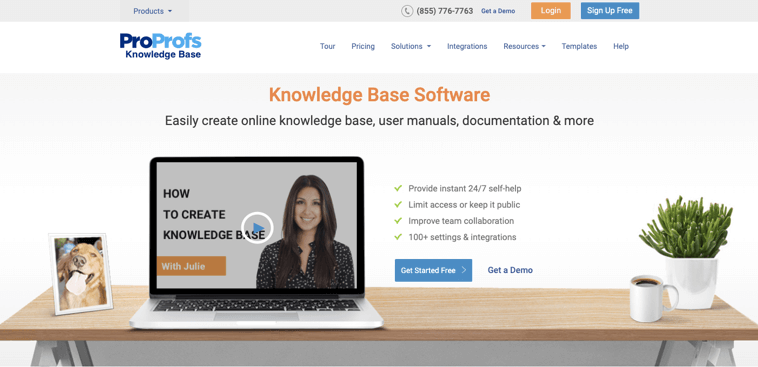
You can use ProProfs Knowledge Base to:
- Create a customer-facing or employee-focused knowledge base
- Reduce the support ticket volume by providing customers with 24×7 self-service
- Make content creation a collaborative process by involving individuals and groups and assigning them specific roles and permissions
- Build a fully customized knowledge base that’s aligned with your branding
- Keep the knowledge base content secure with features like password control and conditional content
Pricing
ProProfs Knowledge Base offers three pricing levels:
- Essentials – Starts at $49/author/month
- Enterprise – Available on Request
Pros & Cons of ProProfs Knowledge Base
Pros:
- The software works seamlessly with kins – ProProfs Help Desk and Live Chat, helping you provide an all-round support experience to customers
- There are 40+ professionally crafted templates to create anything you want, from a knowledge base and documentation to manuals and guides.
- Third-party integrations with the top ticketing, survey, live chat, analytics, and collaboration tools
- A comprehensive built-in reporting system that offers detailed insights into knowledge base performance
Cons:
- No mobile app available
- Internal comments and co-editing options missing
2. Archbee
Archbee is a new entrant in the field of knowledge management that came to the market in 2019. Ideal for startups, agencies, and SaaS companies, this Slab competitor has managed to earn credibility in a short period of time by helping organizations create top-notch developer, customer-facing, and internal documentation. With features like native diagramming and custom blocks, the tool makes it super easy to build documentation of your choice.
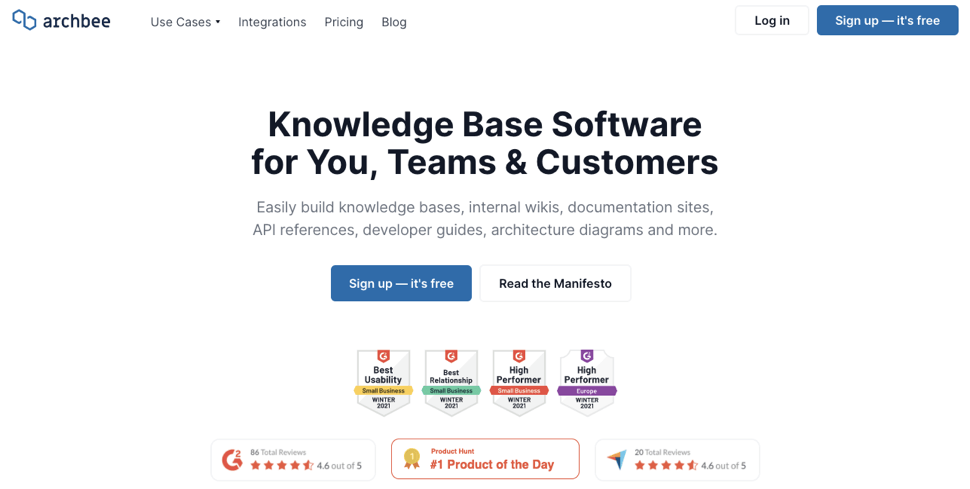
You can use Archbee to:
- Create developer and API documentation, internal knowledge base, and customer service knowledge base
- Create content quickly with custom blocks
- Keep documents, projects, and people organized in collections
- Link important information in the documentation using knowledge graphs
Pricing
Archbee offers three price plans:
- Starting – Free plan with limited features
- Growing – $20/month
- Scaling – $60/month
Pros & Cons of Slab
Pros:
- Teams can easily collaborate on documents with comments, links, and mentions
- Infinite document history, so you can revert to a document created even months before
- An advanced access control system to define the access level of each individual or team and ensure the privacy of sensitive content
Cons:
- The growing and scaling plans are available for a limited number of users. You’ve to pay more for every additional user.
- No integrations with customer support tools like ticketing and live chat.
- The tool doesn’t support any other language than English
3. Tettra
A free Slab alternative that is designed mainly for internal use is Tettra. It unifies your team’s knowledge on a single platform and uses smart workflows to keep the information organized and up to date. A simple user interface and an excellent structure help teams browse Tettra effortlessly. Best for growing teams, this cloud-based tool is perfect if you are looking for an internal knowledge base or wiki solutions.
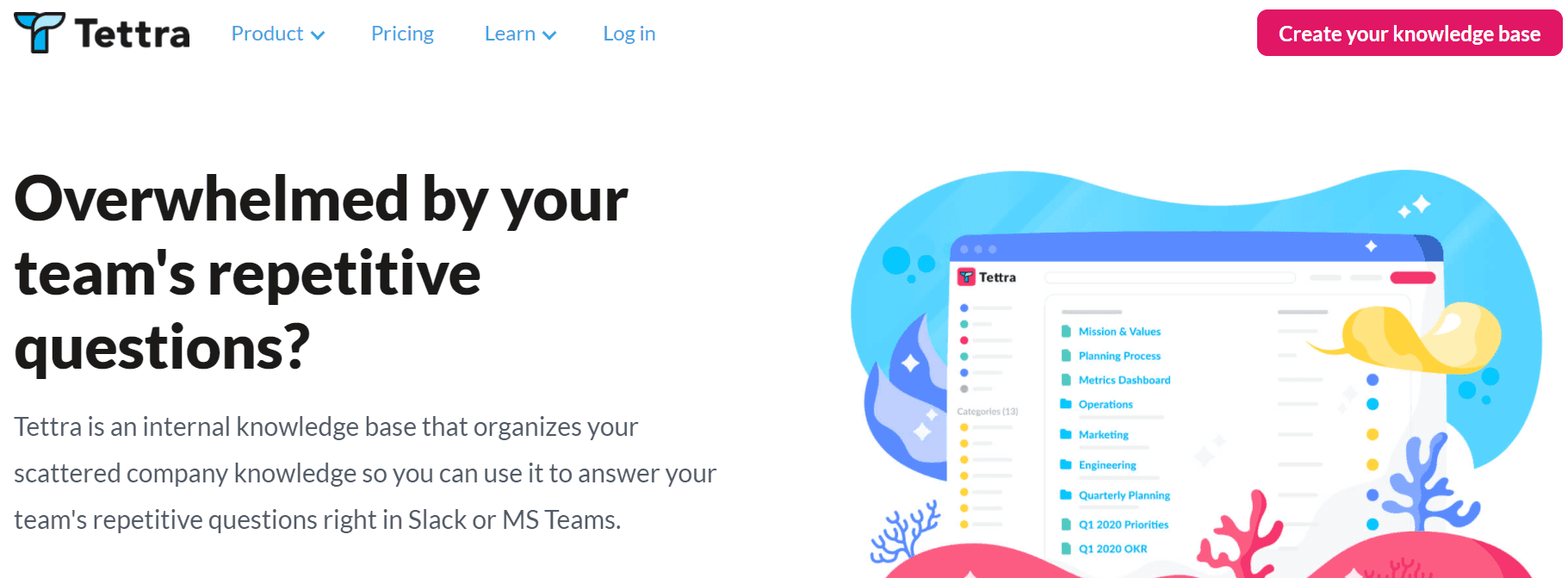
You can use Tettra to:
- Make documenting information simpler with a simple and intuitive editor
- Mention and assign tasks to team members so that nothing is missed out
- Create suggestions for missing information and assign it to the right person
- Connect Tettra with relevant Slack channels and reduce context switching
Pricing
Tettra offers three price plans:
- Starting – Free for first five users
- Scaling – $99/10 users/month
- Enterprise – Available on request
Pros & Cons of Tettra
Pros:
- Integrates with popular communication, productivity, and collaboration tools
- Powerful search functionality that delivers accurate answers even if you don’t type the exact keywords
- Subject matter experts can regularly verify content, and teams can request updates if something looks outdated
Cons:
- Designed mainly for internal use. Not an ideal solution for self-service customer support
- SEO features missing
4. Slite
Ideal for remote teams, Slite provides a centralized hub to share ideas and work together regardless of the time or place. This Slab wiki alternative offers a great structure that makes your content more clear and less chaotic. There are best-practice templates for everything from weekly reviews and product planning to stand-up meetings and creative briefs, so you can get started with your internal knowledge base with minimum hassles.
With channels for better organization and a robust search function for quick information discovery, Slite is one of the best Slab alternatives in the market today.
You can use Slite to:
- Keep remote teams connected and help them work together seamlessly despite the difference in time and place
- Document processes and pen down ideas quickly with its fast online editing features
- Invite clients as guests and collaborate with them on specific documents
- Discuss projects and work on them together with no distractions of meetings, emails, and shoulder taps.
Pricing
Slite offers three price plans:
- Free – $0 with limitations
- Standard – $6.67/member/month
- Enterprise – Available on request
Pros & Cons of Slite
Pros:
- Works well for remote teams and keeps them connected no matter the time and place
- Ready-made templates for all your requirements so that you don’t have to build everything from scratch
- Enterprise-grade security that is OKTA, Slack SSO, and OpenID compliant
Cons:
- Designed specifically for internal team use
- Navigation can be complex, and sometimes, it works slow on mobile
- Lacks features for search engine optimization
5. GetGuru
GetGuru is another best alternative to Slab wiki. It seamlessly integrates with your workflow, enabling all teams to access company information at their fingertips, anytime and anywhere they want. Whether it’s new employee onboarding, streamlining internal communications, or creating a collaborative workspace – Guru’s versatility as an internal knowledge resource is unbeatable.
The best part about Guru is that it gives easy access to expert-verified, reliable information right where teams are working – Slack, Email, CRM, etc.

You can use Guru to:
- Organize scattered company information in Collections and Boards.
- Provide teams a single source of truth that gives access to expert-verified information they need to do their jobs
- Automate employee onboarding so that new hires can learn at their own pace
- Streamline team workflows and boost collaboration even when working remotely
Pricing
Guru offers three price plans:
- Starter – $5/user/month
- Builder – $10/user/month
- Expert – $20/user/month
Pros & Cons of Guru
Pros:
- Keeps teams aligned with its Slack and Microsoft Teams integration
- Intelligently designed to meet the unique needs of multiple teams across departments
- Prompt company experts to verify and update the knowledge regularly
- Give AI-powered suggestions to reps as they converse with customers via chat
Cons:
- There is a scope of improvement in Guru’s content migration system
- Difficult to locate specific cards if you don’t know the right keywords
- Ideal for internal use. However, it allows you to create public cards that can be shared with customers
6. Atlassian Confluence
Trusted by businesses across the globe, Atlassian Confluence is one of the top alternatives to Slab. This cloud-based software helps you build a remote-friendly workspace for your teams where knowledge can be easily shared, and work can be performed in collaboration with everyone. Confluence works well with Atlassian’s suite of products, including JIRA and Trello. This further extends its capabilities and turns it into a highly valuable tool for internal communication and collaboration.
You can use Confluence to:
- Create a flexible workspace where teams can collaborate on projects
- Enable teams to share announcements, ideas and get feedback on a social intranet
- Tap into the collective knowledge of your teams and use it to create a centralized knowledge hub
- Integrate with collaboration, communication, and project management tools to enhance your team’s productivity
Pricing
Confluence offers four price plans:
- Free – $0 for 10 users
- Standard – $5/user/month
- Premium – $10/user/month
- Enterprise – Available on request
Pros and Cons of Confluence
Pros:
- The tool is forever free for ten users and offers access to basic features in its free plan
- Offers third-party integrations with over 3000 marketplace apps
- Helps you create content quickly and maintain consistency across projects with its best-practice templates
- Content can be easily organized in pages and spaces. Its advanced search and page hierarchy ensures that the search experience is painless.
Cons:
- Designed only for internal company use
- Its standard and premium plan allow creating only one site, which is unfair, given the cost of the plans
7. Notion
Similar software to Slab wiki is Notion. It works as an all-in-one workspace for your employees and is perfect for your team wiki, projects, tasks, meeting notes, and documents. Used by companies like IBM, Spotify, Slack, and Loom, Notion is carefully designed to help teams across departments – product, HR, engineering, design, and marketing, solve problems unique to their fields.
Connecting the whole company through a centralized knowledge hub, Notion ensures that context switching and silos take a backseat.
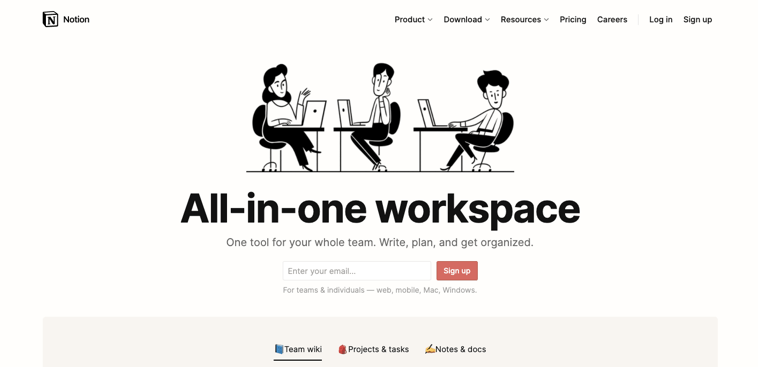
You can use Notion to:
- Provide a comprehensive solution for centralized knowledge sharing, collaboration, and project management
- Keep company knowledge and projects across departments organized
- Empower remote teams to collaborate in real-time through comments, notifications, and shared documents
- Take personal notes, track tasks, and stay organized
Pricing
Notion offers four price plans:
- Personal – $0
- Personal Pro – $4/month
- Team – $8/member/month
- Enterprise – Available on request
Pros and Cons of Notion
Pros:
- 50+ starter templates that make content creation easier
- An excellent importing system that supports files from Evernote, Trello, Google Docs, among others.
- The workspace can be customized with the colors, fonts, designs you like
Cons:
- Not built for self-service customer support
- The structure feels disorganized and complicated
- The Team plan is expensive and misses out on crucial features like Single Sign-on, PDF export, and advanced security controls.
8. Bloomfire
A Slab alternative worth your attention is Bloomfire. If you are looking for a tool that helps you capture and democratize knowledge, connect teams, Bloomfire is the right pick. This knowledge base software is good for company-wide alignment, as it brings teams across departments together, giving them a centralized space to share and access knowledge.
With Bloomfire, content can be quickly created and optimized for search terms without manual tagging. Other features that make it one of the best tools in the market today are – Feedback Loops, AI-generated tags, and smart search.
You can use Bloomfire to:
- Align different teams and departments for better collaboration
- Create experiences aligned with your brand using custom branding
- Allow employees to engage with the content through comments, likes, and personalized feeds
- Integrate with external shared drives like Google Drive, OneDrive, Dropbox, and Box for seamless file syncing
Pricing
Bloomfire offers two price plans:
- Basic – $25/user/month
- Enterprise – Contact for pricing
Pros and Cons of Bloomfire
Pros:
- AI-powered search that deep indexes each and every word to show you accurate information
- In-platform analytics to give you deep insights into knowledge gaps and search trends
- Ability to create custom categories, create groups, and set user permissions
Cons:
- No free plan
- Not many pricing tiers. The basic plan is quite costly to start with
- Designed primarily for internal use only
9. Zoho Wiki
Zoho Wiki makes internal knowledge management easy. You can use it to create workspaces where information can be securely stored and accessed by employees. Be it HR professionals, creative teams, or educators, anyone and everyone can leverage Zoho Wiki to create an online knowledge platform for internal team collaboration and higher productivity.
A practical editor that works like MS Word, quick notifications on any changes in the wiki content, and customizable workspaces are some of the major features of this Slab alternative.
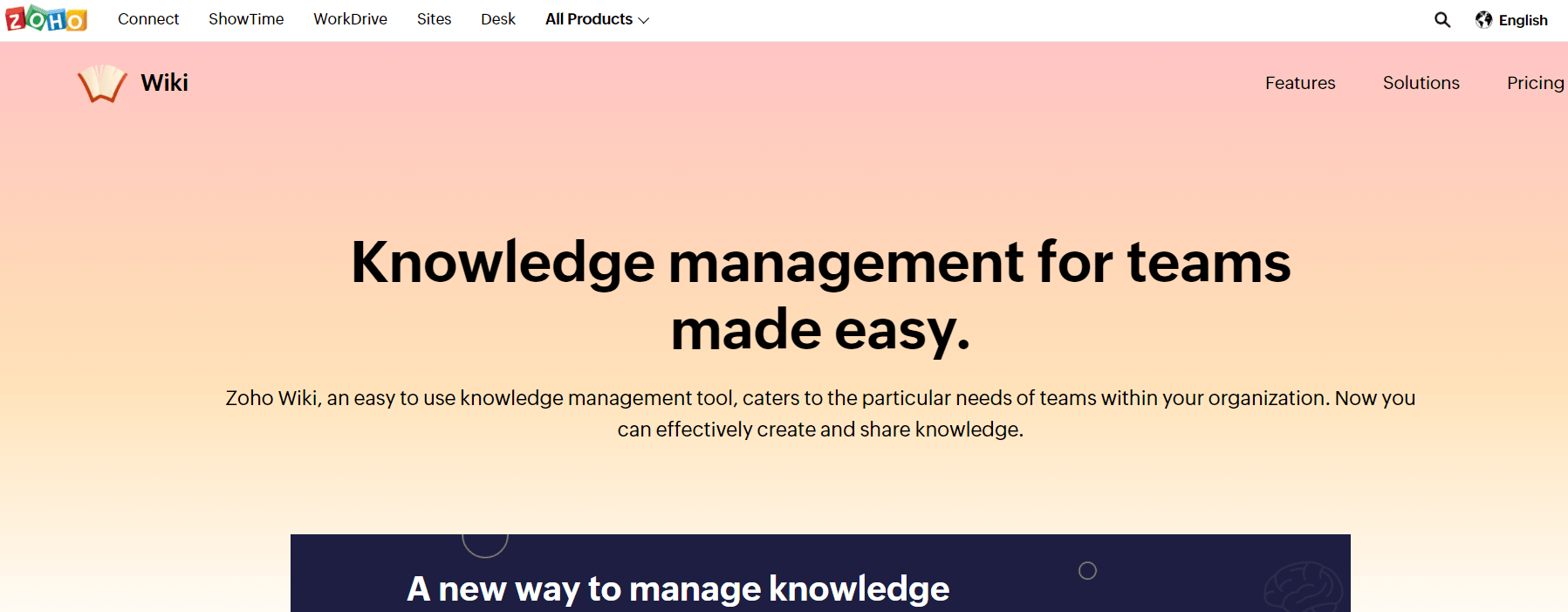
You can use Zoho Wiki to:
- Create fully customizable workspaces that function as separate online wikis having their own security and access controls.
- Integrate with Zoho’s tools or other third-party applications and turn Zoho Wiki into a super powerful resource for team collaboration and productivity
- Create page hierarchies and make it easy for readers to navigate through the content
Pricing
Zoho Wiki offers two price plans:
- Free – $0 with limitations
- Business – $2.24/user/month
Pros and cons of Zoho Wiki
Pros:
- A flexible access control system to keep content secure
- Complete customization with logos, skin colors, panel positions, and more
- You can insert the widgets offered by Zoho such as Zoho Show, Zoho Calendar, Zoho Writer, and many others to your wiki
Cons:
- Limited storage
- No pre-designed templates available
10. Kipwise
Kipwise is a lightweight internal wiki solution that integrates with your favorite tools and aligns well with your workflow. Best for companies looking for solutions to bolster team collaboration, productivity, and employee onboarding, Kipwise comprises all necessary features that a top Slab alternative must-have.
Not just internal knowledge sharing, the tool can also be set up as a customer help center to make work easier for your support agents by presenting them with the most updated and accurate product and company information.
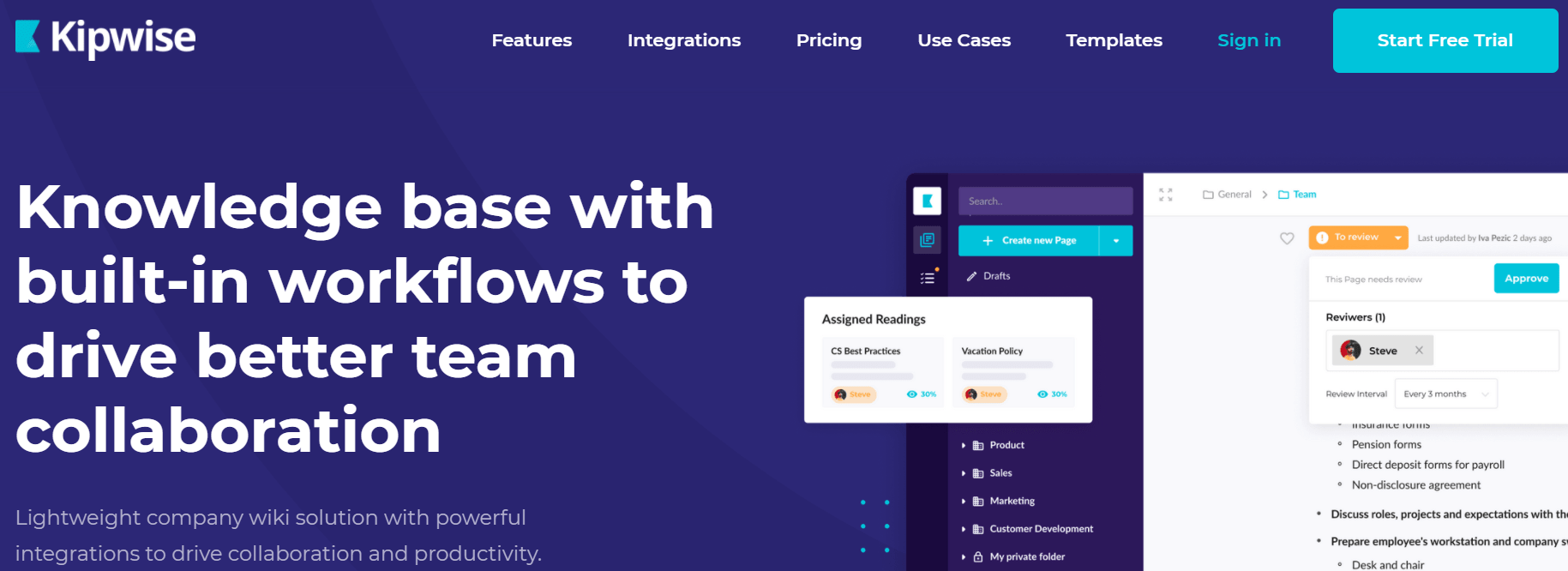
You can use Kipwise to:
- Create online FAQs to reduce repetitive questions and elevate employee productivity
- Standardize workflows and share knowledge across projects so that everyone is on the same page
- Keep remote employees connected and productive with easy access to knowledge
- Assign reviewers for each content piece to make sure that the knowledge base is always fresh and updated
Pricing
Kipwise offers three pricing tiers:
- Basic – $25.5/team/month – for first 10 users
- Professional – $42.5/team/month – for first 10 users
- Enterprise – Available on request
Pros and Cons of Kipwise
Pros:
- It’s easy to search for information in Kipwise using your Slack account
- A range of knowledge base templates for marketing, HR, sales, and other departments
Cons:
- No free plan
- It’s a costly tool as compared to other Slab alternatives
- Lacks in features like CSS and SEO
Best Slab Alternatives Compared
[table “21” not found /]
Which Slab Alternative Is Right for You?
Finding the perfect Slab alternative that fits well in your budget and expectations is nothing less than climbing a mountain. With scores of options available, how to identify the one that’s just right for you?
That’s why we are here. To spare you from all the hard work.
The list of the best Slab alternatives above is curated after analyzing and comparing them on various parameters such as pricing, online reviews, and core features.
While Slite works perfectly for remote teams, GetGuru is an excellent tool to structure and organize content for seamless browsing. While Bloomfire offers great features but is way more pricey than Slab, Notion comes at a nominal price but lacks some key knowledge base features.
One tool that plays it well in crucial areas like pricing, features, usability, and integrations, it’s ProProfs Knowledge Base. It’s simple, feature-packed, and gives the best bang for the bucks you invest.
FREE. All Features. FOREVER!
Try our Forever FREE account with all premium features!







